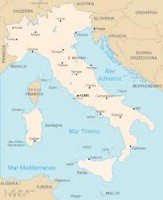The National Action Plan on green public procurement (GPP), worked on by ARTI-Italia, is now being studied by the Italian senate.
The plan was worked on by Italian remanufacturing association ARTI-Italia alongside the Italian Ministry of Environment’s Riccardo Rifici – which The Recycler reported on in March, and which Ravelli wrote about in issue 260 – to help and change the way public procurement works for printer cartridges in Italy, as well as to help improve green public procurement (GPP).
The association’s President, Giovanni Ravelli, stated at the time that Italy “will spend more than €200 billion ($274 billion) a year on the management of its public administration”, and notes that it is “important to build on this type of expenditure to change attitudes towards remanufactured products that are environmentally and socially sustainable”.
Working with the government to “overcome the resistance” against green public procurement, the plan was approved by the Italian government in a ministerial decree adopted regarding cartridges featuring minimum environmental criteria. A new report from the Italian government noted that the Linked to Environmental Stability Law 2014 aims to “promote the green economy and reduce the consumption of resources”, and gave more detail on how the law will change procurement.
One of the main aspects is that it will be compulsory in tenders for goods and services that “the minimum environmental criteria” is “at least 50 percent […] of the total purchase”. Some changes have been made to the law as well, including “an incentive for economic operators participating in public procurement” that have either EMAS registration or Ecolabel-accredited products or services, entailing a 30 percent reduction (or 20 percent for those with ISO14001) of the deposit in the procurement offer.
Another area in which a change has been made is the “environmental assessment of the most economically advantageous” when it comes to procurement, in that the “performance of the contract” will be studied against the Ecolabel accreditation; while other evaluation criteria will study product lifecycles and “lifecycle costing”, which is the cost of a product “during its lifecycle”, with the government referring to the need to “adapt to the new EU directive on public procurement”.
The EU legislation outlines that governments “have an obligation” when it comes to procurement tenders to “include in their tenders and procurement documents the inclusion of at least the technical specifications and the contractual clauses” concerned with minimum environmental criteria (CAM) when it comes to a range of products, including toner and inkjet cartridges and electrical and electronic office equipment (including printers and MFPs)
Silviano Falocco, Director of CompraVerde-BuyGreen, which has been working to improve green public procurement in Italy, stated: “Every day the Italian public entities, through their purchases, make choices of industrial policy for €360 million ($441 million). The European and national objective is to reach 50 percent sustainable procurement of the total purchase. In Italy it would convert about 135 billion purchases a year, at this time; however, our country barely covers nine percent of total purchases through the environmental and social criteria.
“The main obstacle to the implementation of Green Public Procurement (GPP) is given by the lack of information and training of responsible purchasing and spread of GPP, and its methodology in contracting. CompraVerde-BuyGreen is therefore the best opportunity for training and updating on the themes of green procurement, especially in light of the approval by the Environment Committee of the House, on 4 September, [of the law], where there are a number of rules that favour the introduction of GPP in Italy.”
Ravelli also spoke at this year’s Focus on Europe conference in Barcelona about ARTI-Italia’s work, and you can read about this in our report in issue 260.
